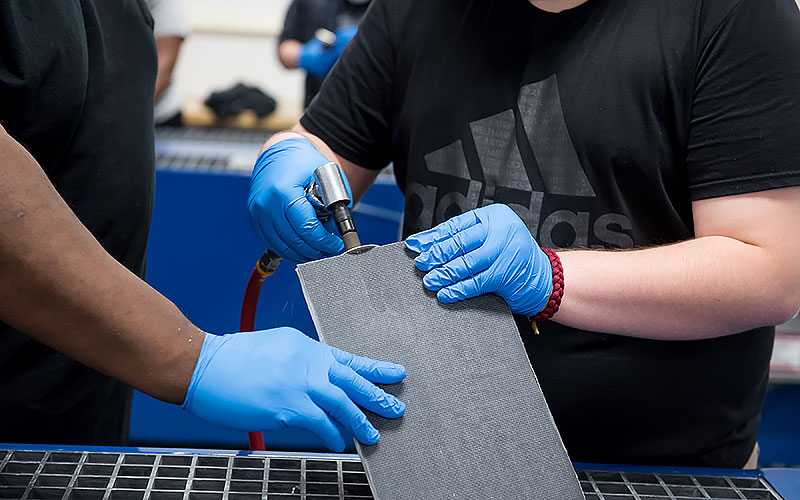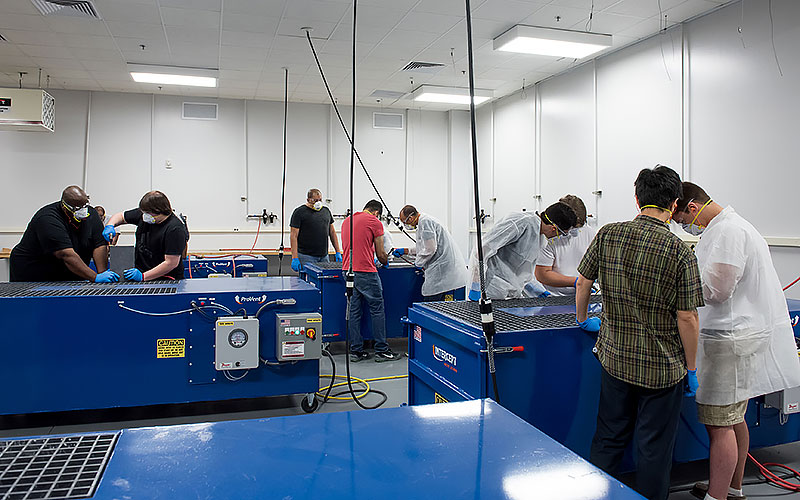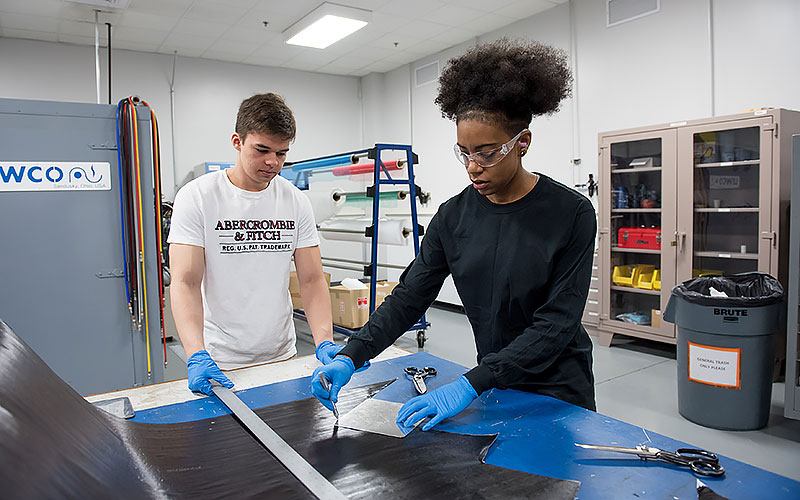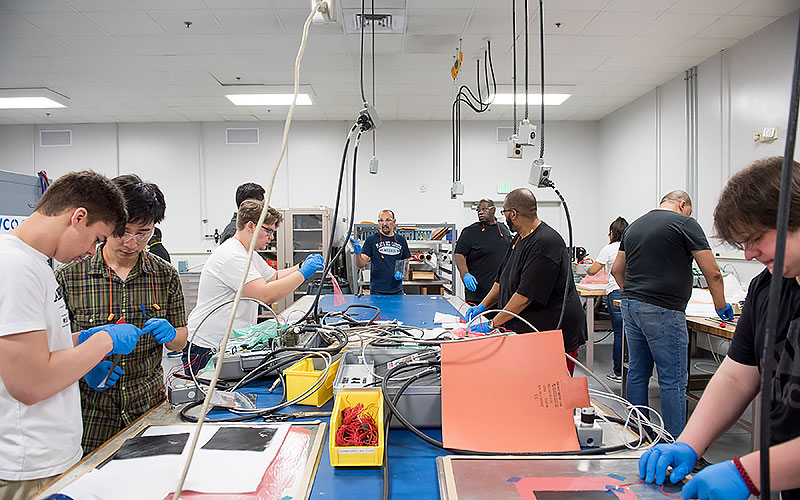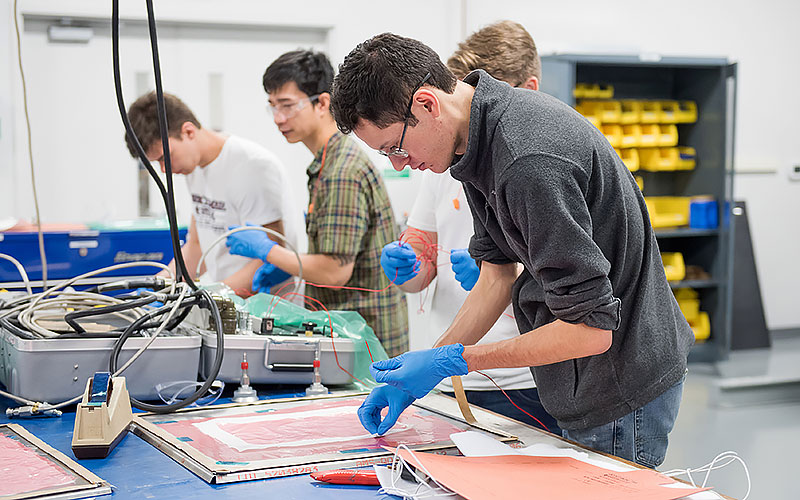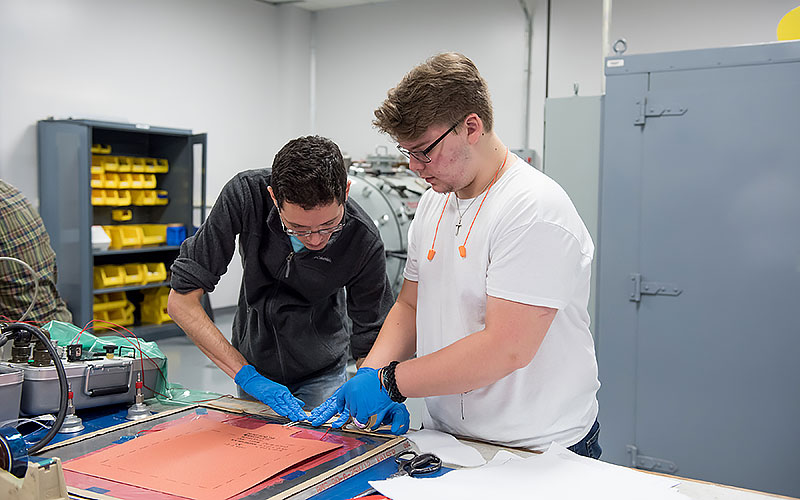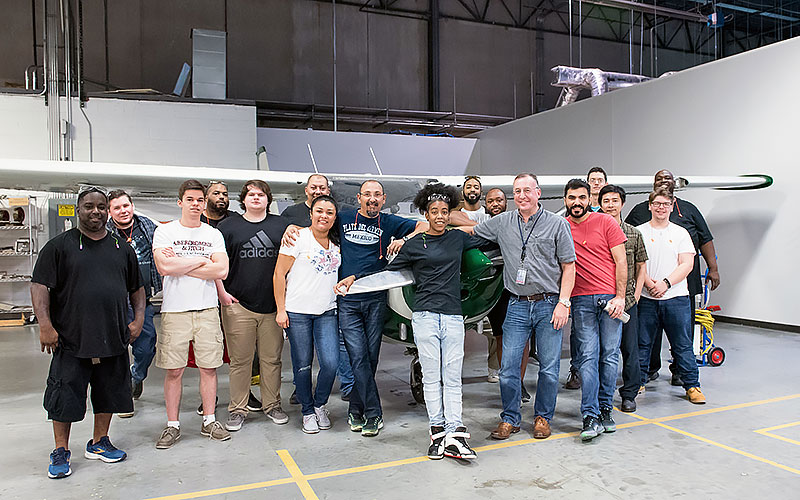Aviation Manufacturing Quick Careers Program (AMQCP): Composite Technology Programs
The field of aircraft composites continues to grow rapidly, and jobs for technicians are in great demand. GTCC provides up-to-date training to meet industry needs by preparing students for entry-level positions in the composite manufacturing and repair fields. GTCC offers programs that can help students be successful and competitive in meeting employers' needs.
Current offerings include composite technology, vacuum infusion, molding fabrication, and adhesive bonding.
Which courses should I take?
Click your experience level to find out.If you are just beginning your journey in aviation, here's how you get started.
Take classes in this order:
- Introduction to Structures
- Structures Assembly
- Structural Repair
- Composite Technology
If you're a working aviation professional or someone who has spent time in the industry, any of these courses are for you.
- Structures Assembly
- Structural Repair
- Composite Technology
If you're not sure, don't worry. Reach out to us, and we'll help you figure out your pathway.
Composite Technology Level 1
Composite Technology Level 1 is a four-week course that instructs laymen and skilled professionals about the fundamentals of advanced composite fabrication, repairs, and processes. Advanced composites are used in many applications and continue to be a primary consideration when replacing other structural components with the advantage of being light and strong.
It is strongly recommended that this course be taken before advancing to the other composite courses.
Current Course Offerings
| Course Description | Cost |
|---|---|
| Composite Technology Level 1 |
$188
|
| The Essentials of Advanced Composite Fabrication and Repair Second Edition (ISBN: 978-1-61954-762-9) |
$85.35
|
| Course | Name | Dates | Days | Hours | Campus | Room | Register |
|---|---|---|---|---|---|---|---|
| MEC-3187-B01 | Composite Technology Level 1 | 02/03/25-02/28/25 | M-F | 8 a.m.-1 p.m. | Aviation II Bldg | 121 | Register Now |
| MEC-3187-B02 | Composite Technology Level 1 | 04/21/25-05/16/25 | M-F | 8 a.m.-1 p.m. | Aviation II Bldg | 121 | Register Now |
Vacuum Infusion Process
Vacuum infusion is a complicated process that uses vacuum pressure to drive the resin into the laminate. Dry materials are laid in a mold and the vacuum is applied before the resin is introduced. It offers many advantages and is commonly used in many composite industries including aerospace, automotive, and marine. Boat hulls, wind turbine blades, bridge beams, and building cladding panels are typical components manufactured using this technique.
The seven-day course provides the necessary skills to produce component parts using the vacuum infusion process.
No courses are available at this time.
Molding Fabrication
The seven-day mold fabrication course will provide instruction on producing "open" and "closed" moldings using the typical tools required for this process. Open molding is a low-cost and effective process used to manufacture composite parts exposed to the atmosphere. Closed molding is a process used to make parts not exposed to the atmosphere. Using the correct tool design and techniques, you will learn to fabricate using the molding process with fiberglass and carbon molds toward an understanding of the potential problems that would affect the final integrity of the part.
No courses are available at this time.
Adhesive Bonding
Upon completion of this five-day course, the graduate will have a thorough knowledge of the adhesive bonding process, be familiar with the typical tools used for this process, and know the problems that may be encountered if the technique is not done correctly. Parts are bonded with various adhesive bonding processes including installation and removal of "Click Bond" fasteners.
No courses are available at this time.
Program Gallery
Frequently Asked Questions
Although the course is not a guarantee of employment, composite technicians with skills in composites manufacturing and repair can find employment in various industries including Aerospace, Auto Racing, Power Generation, and general manufacturing. These industries use composite materials to make their products lightweight and durable. The Boeing 787 airframe is comprised of 50% composites materials. A local Maintenance Repair and Overhaul (MRO) is expanding and has recently built additional hangar space to accommodate the Boeing 787. The demand for expertise in the composite field continues to grow.
$15-$23 per hour plus benefits for entry-level employees.
Local business and industry partners to include Honda Aircraft Co., HAECO, Cabin Solutions, and externally Boeing.
The textbook, "Essentials of Advanced Composite Fabrication and Repair," is purchased at the time of registration. We supply all the tools necessary, and students are not permitted to use any personal tools in class.
There are many opportunities for sponsorships and scholarships to cover the cost of the courses
We suggest your start with our Workforce Training Scholarships application for support. Once you complete the application, you will be contacted about funding and options.
For example, this program qualifies for the Metallica Scholarship program, and you will be considered for the scholarship once you've completed this application.
Our address is 819 Radar Road, Greensboro, NC 27410. We are at the Greensboro Airport across from Honda Aircraft Co. and HAECO.
Credits awarded from completion of the AMQCP Composite Program may be transferred to the Aerostructure Manufacturing and Repair Technology program. Shifts at most companies around the airport complement GTCC’s Aviation Programs. Several companies offer tuition reimbursement as a benefit in support of further education.
A partnership in liaison with the American Composites Manufacturing Association (ACMA) will permit you to enhance your professional qualifications.
